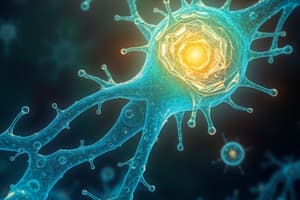Podcast
Questions and Answers
Which of these is NOT a factor contributing to evolutionary changes?
Which of these is NOT a factor contributing to evolutionary changes?
What is the primary focus of human genetics?
What is the primary focus of human genetics?
Which of the following is NOT a key function of microorganisms in ecosystems?
Which of the following is NOT a key function of microorganisms in ecosystems?
What is the role of enzymes in biochemistry?
What is the role of enzymes in biochemistry?
Signup and view all the answers
Which of the following is NOT considered a key area of study within human biology?
Which of the following is NOT considered a key area of study within human biology?
Signup and view all the answers
Which of the following is NOT a key characteristic of life?
Which of the following is NOT a key characteristic of life?
Signup and view all the answers
What does the cell theory NOT assert?
What does the cell theory NOT assert?
Signup and view all the answers
Which organelle is primarily responsible for energy production in a cell?
Which organelle is primarily responsible for energy production in a cell?
Signup and view all the answers
Which statement about DNA mutations is correct?
Which statement about DNA mutations is correct?
Signup and view all the answers
What do abiotic factors in an ecosystem include?
What do abiotic factors in an ecosystem include?
Signup and view all the answers
Which of the following best defines natural selection?
Which of the following best defines natural selection?
Signup and view all the answers
Which of the following defines biodiversity?
Which of the following defines biodiversity?
Signup and view all the answers
What is primarily studied in the field of genetics?
What is primarily studied in the field of genetics?
Signup and view all the answers
Study Notes
Introduction to Biology
- Biology is the study of life and living organisms, encompassing various levels of organization: molecules, cells, tissues, organs, organisms, populations, and ecosystems.
- Key characteristics of life include organization, metabolism, growth, adaptation, response to stimuli, reproduction, and homeostasis.
- Biological systems exhibit emergent properties, meaning that complex features arise from interactions of simpler components.
Cell Biology
- Cells are the fundamental units of life, exhibiting diverse structures and functions.
- The cell theory postulates that all organisms are composed of cells, cells are the basic unit of structure and function in living things, and new cells are produced from existing cells.
- Prokaryotic cells lack a nucleus and membrane-bound organelles, while eukaryotic cells possess both.
- Organelles within cells carry out specialized tasks, such as the mitochondria (energy production), ribosomes (protein synthesis), and the endoplasmic reticulum (protein and lipid synthesis).
Genetics
- Genetics is the study of heredity and variation in organisms.
- DNA (deoxyribonucleic acid) is the genetic material in most organisms, carrying the instructions for building and maintaining an organism.
- Genes are segments of DNA that code for specific proteins, and these proteins determine traits through gene expression.
- Mutations in DNA can lead to changes in traits, and these changes can be beneficial, harmful, or neutral.
- Inheritance patterns (e.g., Mendelian genetics) describe how traits are passed from parents to offspring.
Ecology
- Ecology is the study of interactions between organisms and their environment.
- Ecosystems are complex networks of interacting organisms and their physical surroundings, exhibiting energy flow and nutrient cycles.
- Abiotic factors (e.g., temperature, sunlight, water) and biotic factors (e.g., predation, competition) influence ecological processes.
- Biomes are large-scale ecosystems characterized by specific climates and dominant plant life.
- Biodiversity is the variety of life within a given area and plays a crucial role in maintaining ecosystem health.
Evolution
- Evolution is the change in heritable characteristics of biological populations over successive generations.
- Natural selection is a key mechanism of evolution, where individuals with traits better suited to their environment are more likely to survive and reproduce.
- Genetic drift, gene flow, and mutations also contribute to evolutionary changes.
- Speciation is the process by which new species arise from existing ones.
- Phylogeny describes the evolutionary relationships between organisms.
Human Biology
- Human biology explores aspects of human anatomy, physiology, and health.
- The human circulatory, respiratory, nervous, and digestive systems perform vital functions.
- Human genetics and heredity influence human health and traits.
- Human evolution investigates the historical development of Homo sapiens.
- Public health focuses on preventing diseases and promoting health in populations.
Microbiology
- Microbiology is the study of microorganisms such as bacteria, viruses, fungi, and protists.
- Microorganisms play vital roles in ecosystems, including decomposition and nutrient cycling.
- Some microbes are pathogenic, causing diseases.
- Microbiology research impacts various fields such as medicine, agriculture, and biotechnology.
Biochemistry
- Biochemistry studies the chemical processes within and relating to living organisms.
- Biochemical reactions are crucial for maintaining life, including metabolism, energy production, and biosynthesis.
- Important molecules in biochemistry include carbohydrates, lipids, proteins, and nucleic acids.
- Enzymes catalyze biochemical reactions.
Studying That Suits You
Use AI to generate personalized quizzes and flashcards to suit your learning preferences.
Description
This quiz covers the fundamentals of biology, including the study of life and living organisms. It delves into cell biology, highlighting the cell theory, structures of prokaryotic and eukaryotic cells, and the functions of various organelles. Test your understanding of key biological concepts and characteristics of life.




